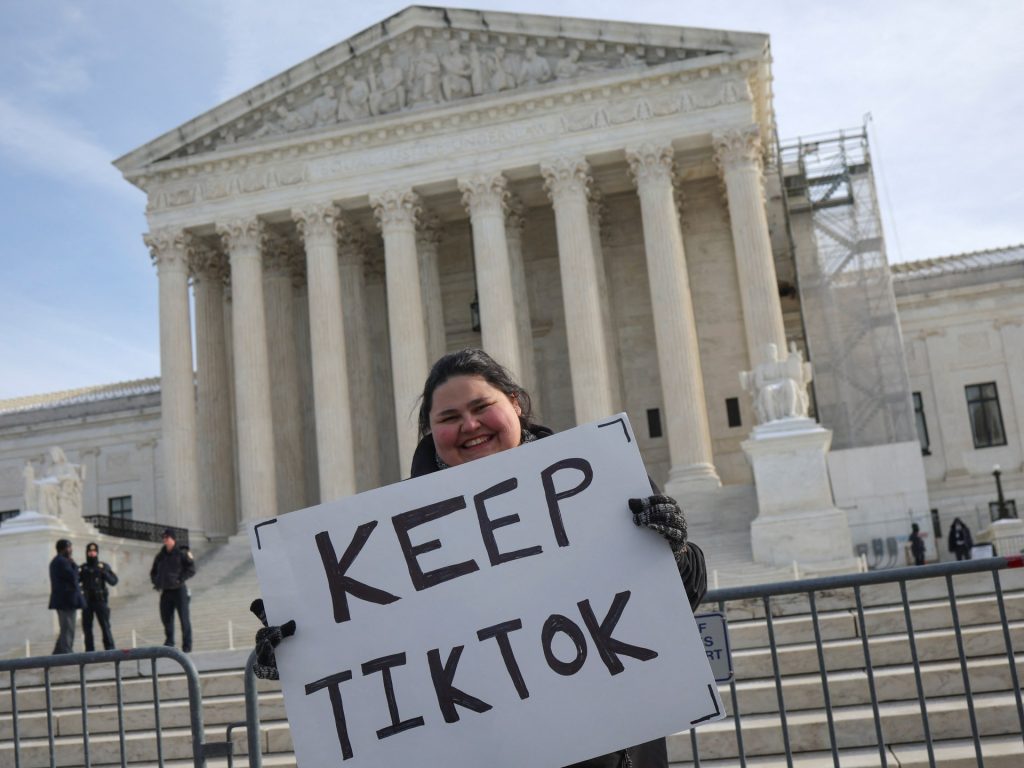Justices on the United States Supreme Court have expressed skepticism over a lawsuit by video-sharing platform TikTok that seeks to overturn a law that would force sales of the app or ban it until January 19.
Friday’s hearing is the latest in a legal saga pitting the U.S. government against ByteDance, TikTok’s parent company, in a battle over free speech and national security concerns.
The law in question was signed in April and declared that ByteDance faces a deadline for selling its US shares or a ban.
The bill received strong bipartisan support, with lawmakers expressing fears that China-based ByteDance could collect user data and share it with the Chinese government. Outgoing US President Joe Biden finally signed it into law.
But ByteDance and TikTok users have challenged the constitutionality of the law, arguing that a ban on the app would restrict their right to free speech.
During Friday’s hearing, the Supreme Court appeared to be swayed by the government’s position that the app allows the Chinese government to spy on Americans and conduct covert influence operations.
Conservative Justice Samuel Alito also suggested the possibility of issuing a so-called administrative stay, which would temporarily put the law on hold while the court decides how to proceed.
The Supreme Court’s consideration of the case comes at a time of ongoing trade tensions between the United States and China, the world’s two largest economies.
President-elect Donald Trump, who is set to begin his second term a day after the ban goes into effect, promised during his presidential campaign to “save” the platform.
That marks a turnaround from his first term, when he unsuccessfully tried to ban TikTok.
In December, Trump asked the Supreme Court to put implementation of the law on hold to allow his administration “the opportunity to pursue a political resolution of the issues at issue in this case.”
Noel Francisco, a lawyer for TikTok and ByteDance, stressed in court that the law risks shutting down one of the most popular platforms in the United States.
“This act should not stand,” Francisco said. He dismissed fears “that Americans, even if fully informed, could be persuaded by Chinese misinformation” as “a decision that the First Amendment leaves to the people.”
Francisco called on the justices to at least temporarily suspend the law, “which will allow you to carefully consider this momentous matter and, for the reasons outlined by the president-elect, potentially bring the case up for debate.”
“Weaponize TikTok” to harm the US
TikTok has about 170 million American users, about half of the U.S. population.
Attorney General Elizabeth Prelogar, speaking for the Biden administration, said Chinese control of TikTok poses a serious threat to U.S. national security.
The immense amounts of data the app could collect on users and their contacts could give China a powerful tool for harassment, recruitment and espionage, she explained.
China could then “use TikTok as a weapon to harm the United States at any time.”
Prelogar added that the First Amendment does not prevent Congress from taking action to protect Americans and their data.
Several justices appeared receptive to those arguments during Friday’s hearing. Conservative Chief Justice John Roberts pressed TikTok’s lawyers about the company’s Chinese ownership.
“Should we ignore the fact that the top parent is actually doing intelligence work for the Chinese government?” Roberts asked.
“It seems to me that you are ignoring Congress’ biggest concern here – namely Chinese manipulation of the content and the sourcing and harvesting of the content.”
“Congress doesn’t care what’s on TikTok,” Roberts added, appearing to brush aside free speech arguments.
Left-leaning Justice Elena Kagan also suggested that April’s TikTok law “only targets this foreign company that does not have First Amendment rights.”
TikTok, ByteDance and app users had appealed a lower court ruling that upheld the law, rejecting their argument that it violated the U.S. Constitution’s First Amendment protections for free speech.


